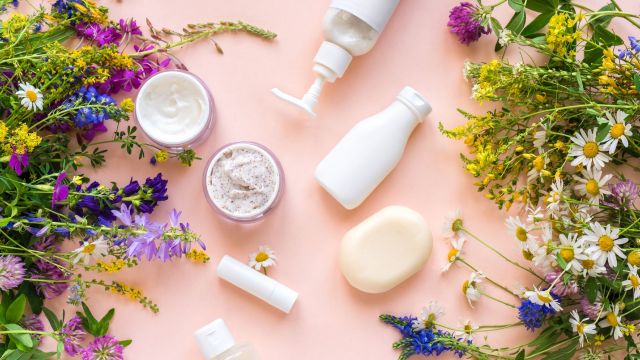Cambridge Dictionary defines ‘organic’ as “not using artificial chemicals in the growing of plants and animals for food and other products.” Applied to beauty, it makes sense we’d want to be use products without chemicals or unknown nasties. However, greenwashing – when products are packaged to appear natural and eco-friendly, without necessarily having the right credentials – working out what’s truly organic can be harder than you might think.So what does ‘organic beauty’ actually mean?
According to Charlotte Vohtz, founder of beauty brand Green People, organic products “are made using plant-based ingredients, but what makes them different to ‘natural’ is they support the entire environmental concept of the preservation and growth of our natural world. This includes avoiding exposure to chemical pesticides, herbicides, fungicides and growth suppressants during farming, while actively supporting and improving soil health for future generations.”
However, Vohtz wants to make the distinction between organic and certified organic cosmetics. “In fact, a product could contain less than 1% organic ingredients and still be called ‘organic’, but the regulations for certified organic products are very different,” she explains. “Choosing certified organic cosmetics guarantees plant derived ingredients and formulations which must avoid harmful synthetic chemicals, artificial preservatives, irradiation, genetically modified organisms and animal testing.
“There are different certification bodies, but you can be assured that a certified product comes without harmful ingredients, promotes health and wellbeing, and is good for the environment too.”Why the popularity explosion in all things organic?
View this post on InstagramAdvertisement
Vohtz refers to organic beauty as a “niche market”, but this is shifting as “people are changing their way of thinking” and becoming “more aware of what they are putting on their skin and question where the ingredients come from”.
The statistics back this up. In 2019 the Soil Association Certification Organic Beauty and Wellbeing Market Report found a 23% year on year growth of certified beauty and wellbeing – the ninth year of growth in a row for the sector. This is likely to continue well into 2020, particularly as conversations around our impact on the environment become increasingly vital.What are the benefits of organic products?
Vohtz set up Green People when she couldn’t find any products to soothe her daughter’s eczema. “By choosing to use organic skincare, you are also opting to avoid synthetic ingredients and fragrances that have been linked to causing skin irritation and sensitivities,” she notes. “Because they are not exposed to artificial fertilisers, organic beauty ingredients typically have a rich mineral content and a high volume of skin nourishing vitamins and antioxidants.”
Vohtz suggests these kinds of products are free from “toxic and harsh ingredients [that can] cause skin problems such as acne, blackheads and oily skin”.
She also thinks there are wider environmental benefits. “Organic agriculture forbids the use of artificial fertilisers, pesticides, herbicides, fungicides and growth retardants or enhancers,” says Vohtz. “Instead, it relies on improving soil health so plants grow strongly and are able to resist and withstand threats that weaker, non-organic plants cannot survive.
“As a result of this avoidance of artificial chemicals, organic agriculture creates a thriving and diverse ecosystem that supports a wide diversity of life, including plants, fungi, insects and animals – exactly as nature intended.
“Another benefit is that after the product has been used, any that is rinsed away or enters the waste-stream will readily biodegrade, reducing its environmental impact to minimal levels.”







